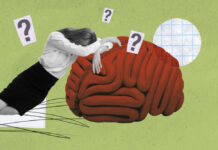A new study, published in The American Journal of Psychiatry, investigates potential antipsychotic properties of cannabidiol (CBD) in patients with schizophrenia. The results of the randomized, placebo-controlled study indicate CBD may lower positive psychotic symptoms and improve cognitive performance and overall functioning. Patients who received CBD, versus the placebo, were more likely to be rated as improved by their treating clinician.
“Although the magnitude of the effect on positive symptoms was modest, it was seen in patients who were already being treated with antipsychotic medication at appropriate dosages; the improvement was thus over and above the effect of antipsychotic treatment,” the researchers, led by Philip McGuire at King’s College London, write.

While antipsychotic medication is typically recommended as the first line of treatment for individuals with schizophrenia, the long term effectiveness have been challenged. When an individual is responsive to medication, it is mainly reflected in reduced positive psychotic symptoms (referring to the presence of odd or usual feelings, thoughts, or behaviors). Non-pharmaceutical treatments, such as lifestyle change and mental health counseling, are effective for individuals diagnosed with schizophrenia and other psychotic disorders as well.
Research investigating the effects of CBD is in its infancy but has shown promise in reducing psychotic symptoms in patients with Parkinson’s disease. In healthy volunteers, CBD has demonstrated the opposite effects of delta-9-tetrahydrocannabinol (THC) on brain functioning and has been found to reduce anxiety, paranoid symptoms, and memory impairment.
In the first ever placebo-controlled trial of CBD in people diagnosed with schizophrenia, McGuire and collogues investigate the effectiveness and safety of CBD used as an adjunct to antipsychotic medications. Eighty-three patients with a diagnosis of schizophrenia or similar psychotic disorders participated in the 8-week, double-blind, and parallel-group trial at 15 hospitals across the U.K., Romania, and Poland. Participants were randomly assigned to receive two divided doses of 1,000 mg of CBD daily or two doses of the placebo to be taken alongside their regularly prescribed antipsychotic medication regime.
Following the 8-week trial, the researchers found significant changes in the CBD group when compared to the placebo group. Positive psychotic symptoms were significantly reduced from baseline to the end of the study for the CBD group. Most notably, before unblinding, patients from the CBD group were rated as “improved” by their treating clinicians significantly more than those from the placebo group. Adverse effects were mild and reportedly resolved on their own. Other differences existed between the groups, such as improved Global Assessment of Functioning scale (GAF) scores, cognitive ability, and motor skills, although these results were not statistically significant.
“The trend for an overall improvement in cognitive performance raises the possibility that CBD may have beneficial effects on cognition,” the authors write. “Post hoc analyses indicated that the strongest improvements were in motor speed and executive functioning.”
This study provides support for more research examining the role CBD may play in treating psychotic symptomology. The authors conclude, “Because CBD acts in a way different from conventional antipsychotic medication, it may represent a new class of treatment for schizophrenia. However, its potential clinical utility will require further investigation in larger-scale trials.”
****
McGuire, P., Robson, P., Cubala, W. J., Vasile, D., Morrison, P. D., Barron, R., … & Wright, S. (2017). Cannabidiol (CBD) as an adjunctive therapy in schizophrenia: a multicenter randomized controlled trial. American Journal of Psychiatry, 175(3), 225-231. (Link)















poising people and giving them drugs. “used as an adjunct to antipsychotic medications.”
Report comment
I thought marijuana was supposed to trigger “schizophrenia.” There are psychiatric papers claiming as much.
The quacks can’t make up their minds.
Report comment
Well since we now know there is no such thing it cannot be “triggered” by anything.
Report comment
My guess is “schizophrenics” in these studies get a little too stoned and hallucinate. They get locked up and put on psych drugs to make them “schizophrenic” till they die or escape.
Ironic how Psychiatry wants to use this same substance they have condemned in the past to “treat” the “illness” they accused it of causing. But we’re talking about Psychiatry here. 😀
Report comment
A drug as an adjunct to another drug? One drug is ‘damaging’, but two drugs are ‘healing’? I know that a heck of a lot of money is going to be made with the decriminalization of marijuana, however, who’s looking at a non-drug, health conscious, approach to ‘problems in living’? Recreational drugs, and I’ve used a few, are still, like hard liquor, recreational vices. Sure, CBD will probably make things easier for THC users, but, all in all, it’s the pharmaceutical *cough* market that you are fostering thereby. Drug ‘research and development’ is not the same thing as life skills mastery and acquired wisdom.
Report comment
This reminds me of an item in the old compilation Orthomolecular Psychiatry edited by Linus Pauling and David Hawkins in1974. In an essay by Hawkins describing the North Nassau Mental Health Center, which he ran, he mentioned that the doper patients he had (in the glory days of psychedelic abuse) who only smoked marijuana didn’t relapse like the poly-dopers who were also his patients and were getting basically the same treatments as the others. Perhaps this is related to some of the stuff in this article about CBD.
Report comment
“Agents with anticholinergic properties (e.g., sedating antihistamines; antispasmodics; neuroleptics; phenothiazines; skeletal muscle relaxants; tricyclic antidepressants; disopyramide) may have additive effects when used in combination … Central symptoms may include memory loss, disorientation, incoherence, hallucinations, psychosis, delirium, hyperactivity, twitching or jerking movements, stereotypy, and seizures.” From drugs.com.
How different are the central symptoms of anticholinergic intoxication syndrome from the positive symptoms of schizophrenia? Not very. But since antipsychotic induced anticholinergic toxidrome is not listed in the DSM billing code “bible,” it is always misdiagnosed as one of the billable, but “invalid,” DSM disorders.
Perhaps, weaning people off a drug class (neuroleptics/antipsychotics) that actually creates the positive symptoms of “schizophrenia” would be more effective than giving them more drugs? The neuroleptics create the negative symptoms of “schizophrenia,” too.
https://en.wikipedia.org/wiki/Neuroleptic-induced_deficit_syndrome
Given the reality that the “schizophrenia” treatments create all the symptoms of “schizophrenia,” it’s highly likely that the primary etiology of “schizophrenia” is the “schizophrenia” treatments themselves.
Report comment
Hi ,
I don’t think there is any treatment for “schizophrenia” – tranquillisers are used but that’s it.
A well person cooperating with the “tranquilliser” approach invariably becomes “sick in the head” themselves.
Report comment
speaking of Orthomolecular, I got to thinking the other day…what if, over the long haul (years of “treatment,” which often involves both Rx and the vitamins), a big part of what makes Orthomolecular so effective in bringing about “recovery” is simply reducing psych drug toxicity and improving overall health? That, and…the Orthomolecular doctors were (and are, based on the more modern material I’ve skimmed over) acutely aware of the reality of the “tranquilizer psychosis,” and it seems they do their best to select drugs and dose drugs accordingly.
I mention this because I kind of wonder if part of what’s going on here is that adminstering a calming, relaxing, soothing, perhaps even pleasant to take (I hope so, anyway) substance might also help reduce psych drug toxicity, too. Kind of how benzodiazepines were (and are, at times) used long term in “Schizophrenic” people, and the combination sometimes helps keep the neuroleptic dose lower and “augments treatment,” basically by calming frayed nerves and probably also by helping with neuroleptic induced dysphoria and akathisia, as well. Older data showed that some people with “Schizophrenia” did a-OK taking sufficient quantities of Valium during the “prodromal phase,” which I’m thinking means they took a reasonably pleasant sedative only when things got rough, and their overall results were good.
at a practical level, it seems that new “treatments for Schizophrenia” will, in fact, be used to “augment standard treatment,” because the neuroleptic=”antipsychotic”=”life saving, necessary, lifelong treatment” dogma is basically part of The Psychiatric Catechism. it is what it is, I suppose. I’m beginning to think that the best many of us who are now so thoroughly disillusioned and disgusted can do is get out, warn those whom we can, and hope that the the next generation of “patients” at least get less toxic drugs and other “treatments.”
Report comment
I also wonder if OrthoPsych contributes to increasing hope and a sense of agency in the recipient, beyond whatever concrete physiological health issues are being addressed. One of the worst things about the psychiatric model is that it tells people there is nothing they can do about their “broken brains.” It seems that OMP challenges that directly and says, “Yes, you can!”
Report comment
I think there’s something to that, especially when looking at Hoffer and other psychiatrists of that era. Although they were still very much psychiatrists–Hoffer did shock ‘treatments,’ Osmond apparently got involved in using LSD during research on prisoners–they -were- considerably less sadistic, more humane and thoughtful than the typical psychiatrist of their era. From what I’ve read, they were also a whole lot more honest and transparent about the nature of what they termed “mental illness” and also “treatment.” Some material I’ve skimmed over is almost brutally honest in describing the ill effects of multiple hospitalizations on people, for instance. and yet…
I still take the vitamins, but I don’t think of the vitamins as “treatment for severe mental illness” at this point. Orthomolecular practitioners and fans speak of “side benefits” from the protocols, as opposed to “side effects” (adverse effects) from any Rx available, -especially- the psych drugs. and so…
honestly, the “side benefits” are what have convinced me to continue loading up on basic vitamins, minerals, etc. The “positive effects on mental state” or what have you are a definite plus, but there’s also: lowered blood pressure, improved sleep and anxiety without sedatives, far less trouble with allergies, and an overall improvement in health status and a reduction in healthcare costs. I do think the sense of agency is important, too, especially for me and people like me who whip up a DIY protocol, largely due to the paucity of reputable practitioners available in many places.
Report comment
That’s the point, YIS. Your mental health is part of your physical health, something the average psychiatrist doesn’t seem to understand, just as these individuals don’t understand you can do ECT’s on patients without erasing their long-term memories, simply by keeping them on B3 (one of the reasons Hoffer, et. al. used them on occasion, but with many fewer shocks per patient, unlike our big-time shock docs).
Incidentally, YIS, I use a DIY protocol, too. Now in my early 70’s, I find it interesting how many professionals are amazed I’m not on some kind of medication at my age, particularly the VA guy who does my annual physicals.
Report comment
I take vitamins to compensate for damage caused by years of “med compliance.”
Report comment
One of the worst things about the psychiatric model is that it tells people there is nothing they can do about their “broken brains.” It seems that OMP challenges that directly and says, “Yes, you can!”
So validating “brain damage” is a step in the right direction?
Report comment
Perhaps I worded that carelessly. Helping people find some ACTION they can take to improve their lives provides hope, whereas telling them their brains are broken and that there is nothing to be done about their “lifetime illness” drives people into despair, unless they are smart enough to understand that they’re being scammed. I don’t believe in broken brains, or if there is brain damage, it is observable and is dealt with by neurologists based on actual evidence.
Report comment
“…unless they are smart enough to understand that they’re being scammed.”
I’d say “awake” enough. And waking up happens while one is in the middle of the experience, a matter of being humbled by life.
Awakening is a matter of discovering the truth of a debilitating situation while on the inside of it, and then having to figure out how to get out of it safely and take back one’s power. That’s a step by step transformative process that requires expanding one’s consciousness as one moves along that trajectory, from being scammed to awakening to the toxic oppression of said scam, to becoming free. That’s where being smart comes in, as well as intuitive, courageous, creative, flexible and determined.
Report comment
I agree 100%. It’s not because people are stupid, it’s because they are brainwashed and cowed and unable to use the intelligence they have due to the oppressive conditions they face. Waking up is, indeed, job one!
Report comment
a thought cloud i’m watching while reading this article and thoughtful comments/shares/responses:
is consesual reality/ or what is generally perceived as ‘the norm’ or the ‘way society is for me/we’ is what is seen as ‘normal reality’
wow, this is hard to put to words. um, maybe what is normal is getting so narrow that our periferral vision of our consiousness is seeing alot more of what is outside the consensual reality, and yet wholly there.
see what i see?
Report comment
Isn’t it a smarter idea to reduce the meuroleptica dosis than ad CBD? For isn’t that what the efect is about, reconnect some neuron-connections that has been supressed?
Report comment
Never tried CBD, but cannabis in general is healthful in many situations and can be an adjunct to meditation. It is not a drug in any standard sense. As we used to chant at demos, “Pot is an herb, Reagan is a dope!”
On a related note, I think a requirement for a psych degree should be at least several LSD sessions, preferably with 300-500 microgram doses. That should weed out a whole slew of shrinks!
Report comment
It is strange that such an article did not come out 100 years ago, or maybe even 1000 years ago. Because the use of a vaporizer is associated with the onset of psychosis, it would be logical to assume that marijuana contains an antipsychotic. And these people occupy high positions, get a lot of money for their work.
Report comment